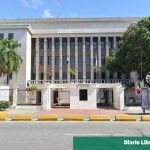The Attorney General’s Office he asked the Constitutional court to overturn the reform to the Law of Guarantees that the Congress approved in 2021 and that allows the territorial entities and the Nation to enter into agreements to execute projects corresponding to the General budget during the campaign for Congress and the Presidency, something that could not be done before.
(See: Duke’s balance of the works in Providencia: ‘We are complying’).
The entity sent the concept to the high court and there are already more than 40 lawsuits against said change.
According to the Attorney General’s Office, this reform, contained in article 124 of Law 2159 of 2021, is contrary to the Constitution “that due to the special force that characterizes the statutory norms (such as the Electoral Guarantees Law), it is not constitutionally possible to modify them through a provision contained in an annual budget law”.
This reform was demanded, among others, alleging that a statutory law could not be reformed into an ordinary law, as happened. According to the Attorney General’s Office, the Constitutional Court made it clear that said change was not possible as it was done “given the affectation that it implies for the principle of checks and balances”.
(See: Colombia, among the economies that would grow the most in 2022 in Latam).
In this sense, the entity said that, since it is about elements related to the prohibition of the participation in politics of public officials, which is a matter that can only be regulated through a special legislative process, what was approved could not be done in a budget law.
Margarita Cabello, the attorney, commented that the fact that the figure of the presidential reelection did not alter the prohibition of making inter-administrative contracts during electoral times that was issued before, when that figure did exist, because “It is a regulation that refers to the participation in politics of public servants on the occasion of the different elections, without being limited to the elections to elect the Head of State.”.
The Attorney General’s Office said that the prohibition of entering into inter-administrative contracts is a regulation of the participation in politics of public servants that is aimed at guaranteeing the principles of the administrative function.
(See: The step by step that will be followed in the country to carry out or not ‘fracking’).
Y “in particular morality, impartiality and efficiency in the performance of duties”.
THE DEFENSE
The Government asked the Court to endorse the norm alleging that the change was necessary due to the effects of the covid-19 pandemic and for economic reactivation, in addition to arguing that with this article resources can be transferred and projects carried out more expeditiously.
According to the Ministry of the Interior, the fact that the Guarantees Law has a statutory character, “does not imply that all its provisions contain the same, since an article that may be contained in a norm processed through the procedure for ordinary laws, may also be contemplated in a statutory law”.
For the Government, Congress does have the faculty from “modify through ordinary laws precepts established in statutory regulations, with observance of the aforementioned conditions, which is why the charge proposed for ignoring the reservation of statutory law is not called to prosper”.
The Government also said that this rule is related to the rest of the Budget Law, contrary to what the lawsuits say, since “the content seeks to regulate what concerns the execution of programs and projects corresponding to it”.
(See: Colombia, on the way to the end of the health crisis due to covid?).
TIME – JUSTICE

















